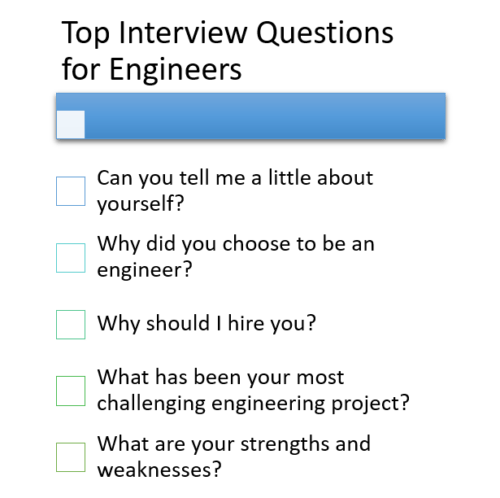Engineers are responsible for so many innovations, from the infrastructure we use for transportation to the food we eat, so it’s no surprise that engineering is a growing career field. In fact, the United States Bureau of Labor Statistics (BLS) anticipates an increase of nearly 140,000 new engineering jobs over just a decade. However, just because opportunities are growing doesn’t mean that getting the job you want will be a breeze. There’s still a great deal of competition for top engineering jobs. Performing well in an interview plays a big role in how successful your job search is. There are plenty of things you should know – about the field of engineering, common interview questions and the value you can bring as an engineer – when you interview for an engineering job.
Prepare in Advance
A successful interview begins long before you introduce yourself and shake your interviewer’s hand. Preparing for an interview in advance is always a good idea. The earlier you start getting ready for the process of getting your first engineering job, the better.
There are many ways to prepare for an interview, but perhaps the best way is to simply practice interviewing. Think of an interview as a conversation with a purpose. That purpose is usually to get a job, but not always. Mock job interviews, in which you practice what you plan to say to your interviewer, can be helpful. You can also prepare for this important conversation through other types of interviews. Ideally, engineering students will take part in at least a couple of information interviews during their education, serving the dual purpose of helping them learn about different engineering careers and allowing them to become familiar with the interviewing process.
The purpose of these informational interviews, or research interviews, isn’t to find a job or to connect with engineers, but to gain information about specific engineering careers.
Know Your Interview Questions
If you want to ace an interview for an engineering job, you should spend some time brushing up on common interview questions and thinking about how to answer those questions. What information about your education, your experience and your personality do you most want a prospective employer to know? What is it in your background and your professional interests that makes you a great match for this job? Make sure that your answers to your interviewer’s questions highlight this information.
Engineers face many of the same interview questions that job candidates in other careers face, including questions about their strengths, weaknesses and short-term and long-term goals. Often, prospective employers will also ask engineers to tell them about past engineering projects they have worked on, in order to get an idea of the candidate’s level of experience. An interviewer may be interested in hearing about challenges as well as successes, and particularly, how the engineer was able to solve problems to accomplish a goal.
Engineers may also be asked questions of a technical nature, which can vary from one engineering discipline to another. An applicant for a civil engineering position might have to answer interview questions about traffic flow models, while a software engineer might need to explain how he or she goes about the process of writing a piece of computer code.
 Remember, an interview is a conversation, not a monologue. It’s important to talk about your experience and what you can bring to the position and the organization. However, it’s also important to focus on what specifically the organization is looking for and what your job responsibilities would be if you are hired. Candidates should be prepared to ask questions as well as answer them.
Remember, an interview is a conversation, not a monologue. It’s important to talk about your experience and what you can bring to the position and the organization. However, it’s also important to focus on what specifically the organization is looking for and what your job responsibilities would be if you are hired. Candidates should be prepared to ask questions as well as answer them.
Coming up with questions to ask your interviewer shows that you’ve done some research into the organization you are interviewing with and gives you insight into whether the job is a good fit for you.
Highlight Your Experience
While you need a solid educational background in the concepts of engineering to succeed in the field, prospective employers are likely to be more interested in an engineer’s practical skills than in his or her theoretical knowledge. For new engineering graduates, this can seem challenging. You need experience to get the job, but you need a job to get experience.
Fortunately, the work you have done as a student or an intern definitely counts as experience for an entry-level engineering role. Think about the projects you completed in your college courses or as part of an internship or co-op program. Employers don’t expect new engineering graduates to have years of full-time work experience under their belts. They just want to know that you have an appropriate amount of experience putting engineering concepts to work in the real world.
If you took part in any kind of contest or an extracurricular activity such as Engineers Without Borders, you can talk about that experience in a job interview, as well.
Have a Plan
When you’re making the transition from college student to engineer, landing a job in your field might seem like a plan in and of itself. However, for the purposes of the interview and your own career advancement, it’s a good idea to look a little further into the future. What would you ultimately like your engineering career to look like? How will a given job help you gain the skills, experience and professional connections you will need to get there?
Some engineers may find themselves branching out from the discipline of engineering they studied in college. In fact, some engineers may earn a bachelor’s degree in one branch of engineering, gain some work experience and decide to go to graduate school with a focus on a different concentration that now seems more relevant to their goals.
Engineers starting their careers should have enough of a plan to help them make their early career choices, but they should also be open to the possibility of the plan changing as they progress in their occupation.
Related Resources:

